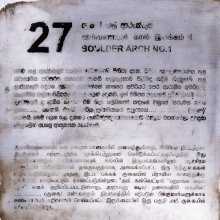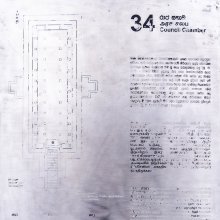Gal: 10 definitions
Introduction:
Gal means something in Hinduism, Sanskrit, Hindi, biology. If you want to know the exact meaning, history, etymology or English translation of this term then check out the descriptions on this page. Add your comment or reference to a book if you want to contribute to this summary article.
Images (photo gallery)
(+9 more images available)
Biology (plants and animals)
Source: Google Books: CRC World Dictionary (Regional names)1) Gal in India is the name of a plant defined with Catunaregam spinosa in various botanical sources. This page contains potential references in Ayurveda, modern medicine, and other folk traditions or local practices It has the synonym Lachnosiphonium obovatum Hochst. (among others).
2) Gal is also identified with Setaria italica It has the synonym Panicum glomeratum Moench, nom. illeg. superfl. (etc.).
Example references for further research on medicinal uses or toxicity (see latin names for full list):
· Linnaea (1838)
· Scientia Agricultura Sinica (1989)
· Revisio Generum Plantarum (1891)
· Encycl., Suppl. (Lam.) (1812)
· Transactions of the Kansas Academy of Science (1913)
· Rheinische Flora (1843)
If you are looking for specific details regarding Gal, for example pregnancy safety, diet and recipes, extract dosage, chemical composition, health benefits, side effects, have a look at these references.

This sections includes definitions from the five kingdoms of living things: Animals, Plants, Fungi, Protists and Monera. It will include both the official binomial nomenclature (scientific names usually in Latin) as well as regional spellings and variants.
Languages of India and abroad
Sanskrit dictionary
Source: DDSA: The practical Sanskrit-English dictionaryGal (गल्).—1 P. (galati, -jagāla, agālīt, galitum, galita)
1) To drop, drip, ooze, trickle; जलमिव गलत्युपदिष्टम् (jalamiva galatyupadiṣṭam) K.13; अच्छकपोलमूलगलितैः (acchakapolamūlagalitaiḥ) (aśrubhiḥ) Amaruśataka 29,96; Bv.2.21; R.19.22.
2) To drop or fall down; शरदमच्छगलद्वस- नोपमा (śaradamacchagaladvasa- nopamā) Śiśupālavadha 6.42;9.75; प्रतोदा जगलुः (pratodā jagaluḥ) Bhaṭṭikāvya 14.99;17.87. गलद्धम्मिल्ल (galaddhammilla) Gītagovinda 2; R.7.1; Meghadūta 46.
3) To vanish, disappear, pass away, be removed; गलति मध्यरात्रे (galati madhyarātre) Dk.; शैशवेन सह गलति गुरुजनस्नेहः (śaiśavena saha galati gurujanasnehaḥ) K.289; विद्यां प्रमादगलिता- मिव चिन्तयामि (vidyāṃ pramādagalitā- miva cintayāmi) Ch. P.1; Bhartṛhari 2.44; Bhaṭṭikāvya 5.43; R.3.7.
4) To eat, swallow (connected with gṝ). -Caus. or 1 U. (p. p. galita)
1) To pour out.
2) To filter, strain.
3) To flow (Ā.).
4) To fuse, liquefy, dissolve, melt. -With निस् (nis) to ooze or flow out, trickle down; निर्गलिताम्बुगर्भं शरद्घनं नार्दति चातकोऽपि (nirgalitāmbugarbhaṃ śaradghanaṃ nārdati cātako'pi) R.5.17.
-paryā to drop down; Bhaṭṭikāvya 2.4.
Source: Cologne Digital Sanskrit Dictionaries: Shabda-Sagara Sanskrit-English DictionaryGal (गल्).—[gala] r. 1st cl. (galati) 1. To eat. 2. To ooze; also (ṅ) galaṅ r. 10th cl. (galayate) To drop, to ooze or distil. With ava prefixed, To fall, to fall down or off; With vi, 1. To go, to approach. 2. To bear or support.
Source: Cologne Digital Sanskrit Dictionaries: Benfey Sanskrit-English DictionaryGal (गल्).—(akin to gur, cf. ud -gur), i. 1, [Parasmaipada.] 1. To drop, to distil, [Kathāsaritsāgara, (ed. Brockhaus.)] 11, 57. 2. To fall, [Śiśupālavadha] 9, 75. 3. To disappear, [Bhartṛhari, (ed. Bohlen.)] 1, 69.
— [Causal.] gālaya, 1. To percolate, [Daśakumāracarita] 156, 2. 2. To sift, [Suśruta] 1, 165, 18. 3. To dilute, [Suśruta] 1, 166, 6.
— With the prep. ava ava, To fall off, [Śiśupālavadha] 8, 34.
— With ā ā, To fall, [Rāmāyaṇa] 5, 13, 34.
— With samā sam-ā, To tumble down, Mahābhārata 1, 1409.
— With ud ud, To burst forth, [Bhāgavata-Purāṇa, (ed. Burnouf.)] 1, 10, 14.
— With nis nis, nirgalita, Distilling, [Raghuvaṃśa, (ed. Stenzler.)] 5, 17.
— With pari pari, parigalita, 1. Tumbled down, Mahābhārata 1, 1183. 2. Sunk in, [Pañcatantra] 8, 17.
— With vi vi, 1. To distil, [Prabodhacandrodaya, (ed. Brockhaus.)] 79, 16. 2. To fall off, [Amaruśataka, (ed. Calcutt.)] 36. 3. To disappear, [Kathāsaritsāgara, (ed. Brockhaus.)] 7, 75. vigalita, 1. Drained by distilling, Mahābhārata 1, 1182. 2. Liquefied, dissolved, Kathās 18, 78; [Gītagovinda. ed. Lassen.] 1, 31. 3. Tumbled down, Mahābhārata 4, 826. 4. Unwieldy, [Bhartṛhari, (ed. Bohlen.)] 3, 74.
— Cf. garuḍa, and [Latin] volare (concerning the signification, cf. pat), (Causal).
--- OR ---
Gal (गल्).—i. 10, Atm. To distil; see 1. gal.
--- OR ---
Gal (गल्).—i. 1, [Parasmaipada.] To eat.
— Cf. 2. gṛ10.
Source: Cologne Digital Sanskrit Dictionaries: Cappeller Sanskrit-English DictionaryGal (गल्).—galati [participle] galita (q.v.) drip, drop, fall, vanish, pass away. [Causative] gālayati cause to drop, liquify, melt, filter, wring out.
Source: Cologne Digital Sanskrit Dictionaries: Monier-Williams Sanskrit-English Dictionary1) Gal (गल्):—1. gal [class] 1. [Parasmaipada] lati, to drip, drop, ooze, trickle, distil, [Pañcatantra v; Brahma-purāṇa; Kathāsaritsāgara] etc.;
—to fall down or off, [Raghuvaṃśa; vii, 10; Bhaṭṭi-kāvya; Gīta-govinda; Prabodha-candrodaya ii];
—to vanish, perish, pass away, [Daśakumāra-carita; Kathāsaritsāgara; Kuvalayānanda] :—[Causal] gālayati, to cause to drop, filter, strain, [Suśruta; Daśakumāra-carita];
—to cause (the water of a dropsical person) to go off, [Caraka vi, 18];
—to fuse, liquefy, dissolve, melt, [Suśruta] : [Ātmanepada] te, to flow, [Dhātupāṭha xxxiii, 26] :—[Intensive] p. jalgalyamāna, causing to drop from one’s body, [Nirukta, by Yāska vii, 13];
2) cf. Old [German] qvall, quillu, qual and quella, ‘a well.’
3) 2. gal (= √2. gṝ) [class] 1. [Parasmaipada] lati, to eat, swallow, [Dhātupāṭha xv, 39.]
Source: DDSA: Paia-sadda-mahannavo; a comprehensive Prakrit Hindi dictionary (S)Gal (गल्) in the Sanskrit language is related to the Prakrit word: Gala.
[Sanskrit to German]
Sanskrit, also spelled संस्कृतम् (saṃskṛtam), is an ancient language of India commonly seen as the grandmother of the Indo-European language family (even English!). Closely allied with Prakrit and Pali, Sanskrit is more exhaustive in both grammar and terms and has the most extensive collection of literature in the world, greatly surpassing its sister-languages Greek and Latin.
Hindi dictionary
Source: DDSA: A practical Hindi-English dictionaryGal in Hindi refers in English to:——an allomorph of '[gala]' and '[gala]' used as the first member in compound words; ~[gamda] a disease resulting in the inflammation of throat-glands; ~[bahiyam] embracement with arms thrown around each other’s neck; ~[muccha] hooked moustache, long curled whiskers; ~[sua] a disease resulting in the inflammation of jaw-gums and consequest fever..—gal (गल) is alternatively transliterated as Gala.
...
See also (Relevant definitions)
Starts with (+704): Gaal, Gal kura, Gal phuli, Gal Vihare, Gal-ber, Gal-karanda, Gal-ladda, Gal-oruwa, Gal-phule, Gal-phulle, Gal-putti, Gala, Galaa, Galaba, Galabadi, Galabahya, Galabala, Galabalanem, Galabalata, Galabali.
Ends with (+676): Acacia senegal, Acajou du senegal, Acalakal, Accabeldimgal, Accadimgal, Accaveldimgal, Accunikal, Adamgal, Adegal, Adigal, Adukumgal, Agal, Aintankal, Aivagal, Akal, Akalakal, Akampatimutalikal, Akavanmakal, Akkamakal, Alaikal.
Full-text (+106): Gala, Galana, Galitaka, Gali, Galanti, Pragal, Galaka, Avagal, Parigalita, Galita, Gulpha, Nigada, Nigal, Vigalita, Galati, Gal-karanda, Gal kura, Gal-ladda, Garut, Galitapradipika.
Relevant text
Search found 24 books and stories containing Gal; (plurals include: Gals). You can also click to the full overview containing English textual excerpts. Below are direct links for the most relevant articles:
Mūlamadhyamakakārikā (by Nāgārjuna)
Chapter 12 - Investigation of Anguish
Chapter 27 - Investigation of Views
Guhyagarbha Tantra (with Commentary) (by Gyurme Dorje)
Text 15.35 (Commentary) < [Chapter 15 (Text and Commentary)]
Text 15.28 (Commentary) < [Chapter 15 (Text and Commentary)]
Text 13.22 (Commentary) < [Chapter 13 (Text and Commentary)]
Bodhisattvacharyavatara (by Andreas Kretschmar)
Text Section 271 < [Khenpo Chöga’s Oral Explanations]
Śāntideva’s Bodhisattva-caryāvatāra - Tibetan Text
Galsworthy < [November 1939]
Reverberations of Dharmakirti’s Philosophy (by Birgit Kellner)





